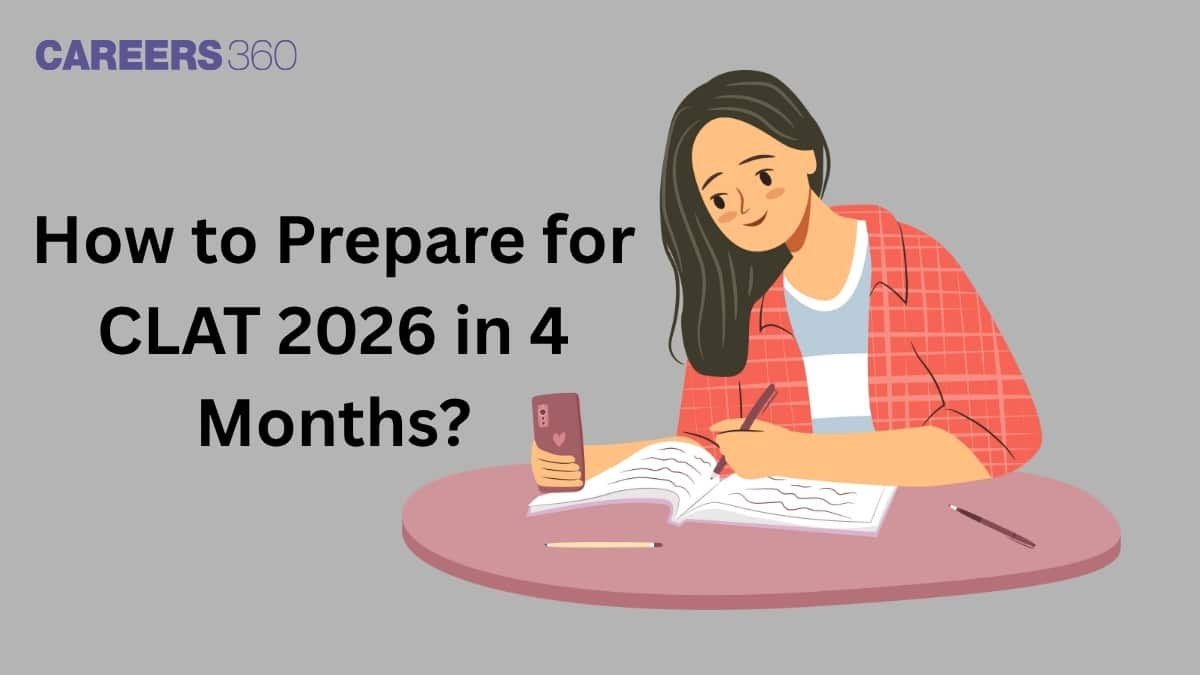With a CLAT rank of 5600, it is challenging for an outside-Delhi candidate to secure a seat at VIPS (Vivekananda Institute of Professional Studies) , especially in the General category, since cutoffs for candidates from outside Delhi are generally higher for top law programmes.
How to Prepare for CLAT 2026 Exam in 4 Months? - Check complete strategies
The clock is running out with just four months remaining to study for the CLAT exam, but there is still time to make a big difference! A targeted study plan, preparation tips can make all the difference, whether your goal is to get into a prestigious National Law University or you want to increase your chances with strategic preparation. We'll cover tried-and-true methods, professional advice, CLAT Exam Preparation Strategy and time-management strategies in this article to help you make the most of your CLAT 2027 Preparation, complete each portion, and confidently walk into the CLAT 2027 exam. Together, let's make these four months a transformative experience for your legal career by following the Study Plan for CLAT!

CLAT 2027 Syllabus Overview
Sections | Weight | No. of questions |
English Language | 20% | 22-26 |
Current Affairs including General Knowledge | 25% | 28-32 |
Legal Reasoning | 25% | 28-32 |
Logical Reasoning | 20% | 22-26 |
Quantitative Techniques | 10% | 10-14 |
How to Prepare for CLAT 2027 Exam in 4 Months - Month-wise Study Plan
The candidates preparing for the CLAT 2027 Exam always have doubts about how to prepare for the exam. To maximise your chances of success in CLAT 2027, a well-structured 4-month study plan is essential. The plan below is divided into weekly phases, focusing on strengthening your concepts, CLAT 2027 Syllabus, practising regularly, and simulating exam conditions. For information on how to effectively manage your time and study, please take a look at the CLAT Time Management article.
Month 1: Establishing Conceptual Clarity and a Foundation
Weeks | Plan | Detailed Strategy |
| Week 1-2 | Legal Aptitude and English Language |
|
| Week 3-4 | General Knowledge and Current Affairs | General Knowledge:
Current Affairs:
|
Month 2: Developing Core Skills and Engaging in Intense Practice
Weeks | Plan | Detailed Strategy |
| Week 5-6 | Logical and Analytical Ability |
Analytical Ability:
|
| Week 7-8 | Mathematics and Mock Tests | Mathematics:
Mock Test
|
Month 3: Time management and advanced practice
Weeks | Plan | Detailed Strategy |
Week 9-10 | Thorough Practice and Editing |
|
| Week 11-12 | Appear For Mocks and Revise Daily |
|
Month 4: Final Revision and Exam Simulation
Weeks | Plan | Detailed Strategy |
Week 13-14 | Revise Key Topics |
|
Week 15 | Mock Test and Final Revision |
|
Popular Courses and Specializations
Popular Degrees
List of colleges accepting CLAT
Browse Law Colleges by State
Questions related to CLAT
On Question asked by student community
Most law colleges require entrance exams like CLAT or state-level law entrance tests. Some private universities may offer direct admission. Visit the official website of the college, fill out the application form, upload required documents, pay the fee, and complete counselling if required.
With a CLAT score of 71.35, you can apply for admission to NLU for mid-to-lower-tier NLU courses, with a state rank of 69.
With a CLAT 2026 rank of 33,825, it's difficult to get a seat at GNLU Silvassa in the initial stages.
You should focus on private institutions, where a CLAT 2026 rank of 33,825 has a higher chance of admission.
For information on domicile quota seats, see this - CLAT Domicile
You can check the admission chances of your daughter at specific law colleges by using the link provided below by entering the required information.
Start a career in Law. Admissions Open for LLB courses for
Among top 100 Universities Globally in the Times Higher Education (THE) Interdisciplinary Science Rankings 2026
Chandigarh University Admissions 2026
ApplyNAAC A+ Accredited | Among top 2% Universities Globally (QS World University Rankings 2026)
Manav Rachna University Law Admissions 2026
ApplyAdmissions open for B.A. LL.B. (Hons.), B.B.A. LL.B. (Hons.) and LL.B Program (3 Years) | School of Law, MRU ranked No. 1 in Law Schools of Excellence in India by GHRDC (2023)
RV University, Bangalore | Law Admissions 2026
ApplyExcellent curriculum; an impressive range of electives, besides core law courses. Up to 100% merit scholarship on a first-come, first-served basis
Unitedworld School of Law Admissions 2026
ApplyMoot Court | Mock trials | Legal Aid Clinic
SRM University, Chennai Law UG 2026
ApplyNAAC A++ Accredited | Ranked #11 by NIRF
